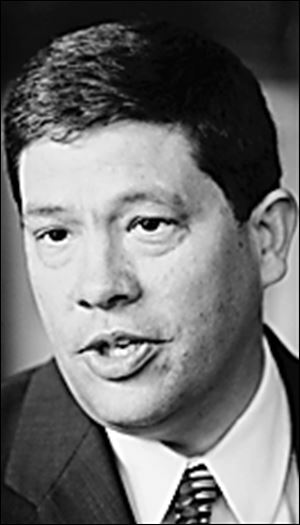
Lt. governor touts Taft tax reforms, $2B bond request
6/3/2005
Johnson
The state's second-in-command visited Toledo yesterday to promote tax reform and a multibillion-dollar bond issue the Taft administration will ask Ohioans to approve in November.
Lt. Gov. Bruce Johnson - the keynote speaker at a Toledo conference of more than 100 mayors from around Ohio - spoke about Gov. Bob Taft's proposed tax reform package, a version of which passed the Ohio Senate on Tuesday as part of next year's proposed state budget.
Mr. Johnson praised the tax package as a way to encourage state investment and create jobs.
"Ohio's tax climate is not competitive. It's a deterrent," Mr. Johnson said, saying surrounding states are more able to attract businesses and investors because of less stringent income, franchise, and personal property taxes.
The tax package - which would reduce state revenue by about $800 million during the next two years - would implement across-the-board personal income tax cuts of 21 percent over the next five years.
The highest-income earners in the state would see their taxes drop from 7.5 percent to 5.9 percent, while the lowest- income earners - those with an adjusted gross income of less than $10,000 a year - would pay no state taxes.
The package also would eliminate the corporate franchise tax and "tangible personal property tax" - business taxes on equipment, inventory, and furniture and fixtures - which Mr. Johnson called "exactly the wrong tax - it penalizes investment." Both taxes would be phased out over five years under the governor's plan, though the Senate version of the budget phases out the franchise tax over four years.
The budget, which has passed the House in a different version, will go to a legislative conference committee before a final agreed-upon version must pass by July 1.
Additionally, Mr. Johnson promoted a $2 billion bond initiative the Taft administration hopes to get on the November ballot.
The initiative would include $1.35 billion for road and infrastructure projects - a $150 million increase over the last such initiative. It also includes $150 million in community grants for cities wishing to build "job-ready sites" - areas such as office parks and manufacturing facilities - to attract companies. Finally, the bond would include $500 million for high-tech research development and promotion.
Mr. Johnson was particularly passionate about Ohio's need for high-tech investment.
"We're being left behind because of our lack of history in this area," he said.
"The state must be at the cutting edge of new technology ... or we will compete exclusively with the Chinese at 50 cents an hour."
The conference, which took place at the Radisson Hotel in downtown Toledo, is an annual event sponsored by the Mayors Association of Ohio.